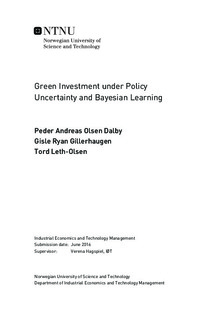Green Investment under Policy Uncertainty and Bayesian Learning
Master thesis
Permanent lenke
http://hdl.handle.net/11250/2433826Utgivelsesdato
2016Metadata
Vis full innførselSamlinger
Sammendrag
In the last decades, several countries have introduced support schemes to accelerate investments in renewable energy (RE). When support schemes have served their purpose, and production goals are met, retraction or revision of currently employed support schemes becomes more likely, as confirmed by several policy changes in European countries.
Investors in RE are greatly affected by the risk of subsidy changes when considering an investment opportunity. Therefore, they need to evaluate the likelihood of potential subsidy retractions and revisions, and take it into account when making an investment decision.
The main purpose of this paper is to examine how investment behavior is affected by updating a subjective belief on the timing of a subsidy revision. We incorporate Bayesian learning into a real options modeling approach. Subsidies in the form of fixed feed-in tariffs (FIT) are considered, and we analyze a scenario where a retroactive downward adjustment of the FIT is expected through a regime switching model.
We find that investors are less likely to invest when the arrival rate of a policy change increases. Further, investors prefer a lower FIT with a long expected lifespan, while policy makers prefer a higher FIT with shorter life span.
In addition, we consider an extension of our model where a FIT scheme is retroactively retracted and followed by a regime under which electricity is sold on a free market.
We find that if policy uncertainty is high, an increase in the FIT will be less effective at accelerating investments. However, if policy risk is low, FIT schemes can be very effective for accelerating investment, even in highly volatile electricity markets.
